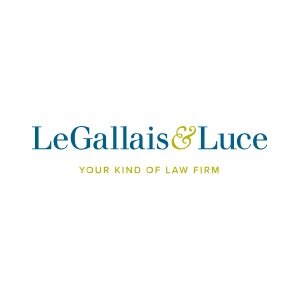Best Property Damage Lawyers in Jersey
Share your needs with us, get contacted by law firms.
Free. Takes 2 min.
Or refine your search by selecting a city:
List of the best lawyers in Jersey
About Property Damage Law in Jersey
Property Damage law in Jersey refers to the legal rules and regulations that govern situations where a person's property has been damaged due to the actions or negligence of another party. This can include damage to homes, vehicles, personal belongings, or any other type of property. The goal of Property Damage law is to provide a remedy for the harmed party and ensure that the responsible party compensates for the damage caused.
Why You May Need a Lawyer
There are several situations where having a lawyer who specializes in Property Damage law can be beneficial:
- If you believe your property has been damaged intentionally or due to negligence by someone else.
- If you are experiencing difficulty in getting the responsible party or their insurance company to compensate you for the damage.
- If you are unsure of your rights and legal options in a property damage case.
- If the damage is extensive and the compensation you are seeking is significant.
Local Laws Overview
In Jersey, Property Damage cases are typically governed by the Residential Tenancies (Jersey) Law 2011 and the Housing (Jersey) Law 1949. These laws outline the rights and obligations of landlords and tenants in cases of property damage, as well as the procedures for seeking compensation for damages. Additionally, the Consumer Protection (Unfair Practices) (Jersey) Law 200- provides provisions for consumer protection in cases of property damage caused by faulty products or services.
Frequently Asked Questions
1. Can I sue someone for damaging my property?
Yes, you can file a civil lawsuit against someone who has damaged your property. It is advisable to consult with a lawyer to understand the legal process and potential outcomes.
2. How do I prove property damage in a legal case?
To prove property damage in a legal case, you may need to provide evidence such as photographs, receipts, repair estimates, witness statements, and any other relevant documentation supporting your claim.
3. What kind of damages can I recover in a property damage case?
In Jersey, you may be able to recover various types of damages in a property damage case, including repair costs, replacement costs, loss of use, diminution of value, and emotional distress damages.
4. Do I need to involve my insurance company in a property damage claim?
It is recommended to report the property damage to your insurance company, as they may cover some or all of the damages. However, if the responsible party has insurance, their insurer should be the one compensating you.
5. What is the statute of limitations for filing a property damage claim in Jersey?
The statute of limitations for property damage claims in Jersey is typically three years from the date the damage occurred. It is crucial to file your claim within this timeframe to avoid losing your right to seek compensation.
6. Can I pursue a property damage claim on my own, without a lawyer?
While you can pursue a property damage claim without a lawyer, having legal representation can increase your chances of getting fair compensation and navigating the legal process effectively.
7. How long does it take to resolve a property damage case in Jersey?
The time it takes to resolve a property damage case can vary depending on the complexity of the case, the cooperation of the parties involved, and the court's schedule. Some cases may be resolved quickly through negotiations, while others may require litigation and take longer to reach a resolution.
8. Can I recover attorney fees in a property damage case in Jersey?
In Jersey, the prevailing party in a property damage case may be able to recover attorney fees and court costs. It is essential to discuss fee arrangements with your lawyer before proceeding with your case.
9. What should I do if my property is damaged in a natural disaster?
If your property is damaged in a natural disaster, such as a hurricane or flood, it is essential to document the damage, contact your insurance company, and consider seeking legal advice to ensure you receive fair compensation for your losses.
10. Can I settle a property damage claim out of court?
Yes, property damage claims can often be settled out of court through negotiations between the parties involved or with the assistance of mediators. It is essential to have a lawyer review any settlement agreement before finalizing it to protect your rights.
Additional Resources
If you need legal assistance with a Property Damage case in Jersey, you can contact the following resources:
- Jersey Legal Information Board
- Jersey Citizens Advice Bureau
Next Steps
If you believe you have a property damage case in Jersey and require legal assistance, your next steps should include:
- Consulting with a lawyer who specializes in Property Damage law to assess your case.
- Gathering evidence and documentation related to the property damage.
- Filing a claim with the appropriate court or arbitration body within the statute of limitations.
- Following your lawyer's advice on negotiations, settlement discussions, or litigation.
Lawzana helps you find the best lawyers and law firms in Jersey through a curated and pre-screened list of qualified legal professionals. Our platform offers rankings and detailed profiles of attorneys and law firms, allowing you to compare based on practice areas, including Property Damage, experience, and client feedback.
Each profile includes a description of the firm's areas of practice, client reviews, team members and partners, year of establishment, spoken languages, office locations, contact information, social media presence, and any published articles or resources. Most firms on our platform speak English and are experienced in both local and international legal matters.
Get a quote from top-rated law firms in Jersey — quickly, securely, and without unnecessary hassle.
Disclaimer:
The information provided on this page is for general informational purposes only and does not constitute legal advice. While we strive to ensure the accuracy and relevance of the content, legal information may change over time, and interpretations of the law can vary. You should always consult with a qualified legal professional for advice specific to your situation.
We disclaim all liability for actions taken or not taken based on the content of this page. If you believe any information is incorrect or outdated, please contact us, and we will review and update it where appropriate.
Browse property damage law firms by city in Jersey
Refine your search by selecting a city.










